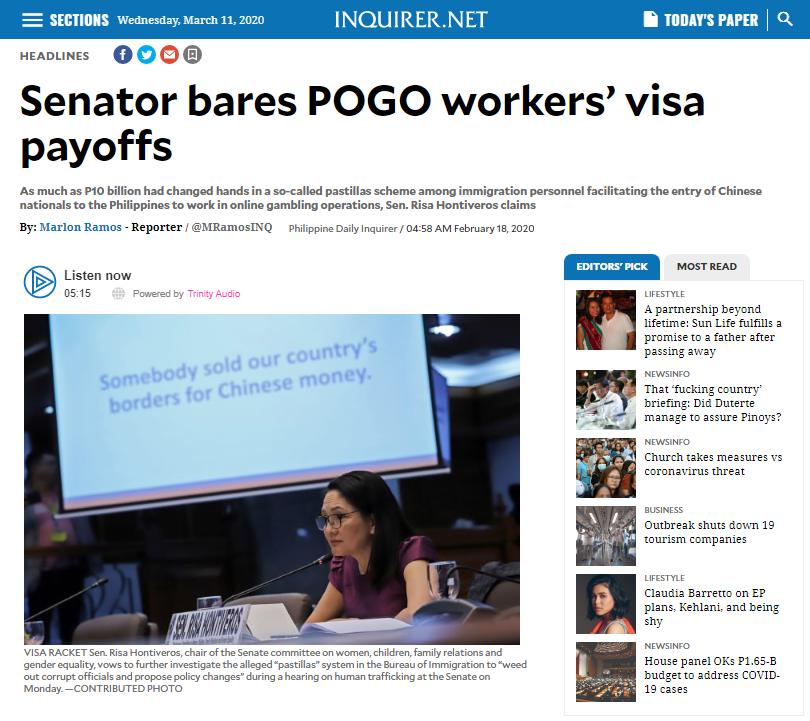Immigration Story: Influx of Chinese and POGOs

THE HEAT IS on Philippine Offshore Gaming Operators (POGO), and by extension, the influx of Chinese nationals, with the latter under scrutiny for criminal activities and incidents of bad conduct.
Separate hearings in recent weeks uncovered new problems, among them the POGO connection to prostitution rings, tax evasion and corruption in the Bureau of Immigration (BI) as presented by Senators Joel Villanueva and Risa Hontiveros.
In late January, Hontiveros began her inquiry on the sex trade which caters mostly to Chinese nationals. In mid-February, she briefed the Senate on a bribery system which was reported to her by Allison Chiong, an Immigration Officer 1. Chiong said that the BI offered special treatment to Chinese nationals in exchange for money, rolled up in a wrapper like milk candy — the reason the racket was dubbed “pastillas.”
In a similar development, Sen. Richard Gordon, during a privilege speech on March 3, said he would launch a Senate investigation of money laundering schemes linked to POGOs.
Controversies have hounded the POGOs since 2018 when the companies drew flak for the influx of foreign workers, mostly Chinese nationals, into Metro Manila. A few media reports took note of businesses which catered specially to them. But these reports did not examine what policies allowed the entry of so many foreign workers when Filipinos continued to seek jobs abroad. The BI, the Department of Labor and Employment (DOLE) and the Department of Foreign Affairs (DFA) have been criticized for unclear policies and lack of coordination resulting in lapses in the supervision of the sector.
(See “Reporting the hearing on foreign workers: More information needed” and “Investigative reports needed on the influx of foreign workers”)
Toward the end of 2019, headlines called attention to crimes involving Chinese nationals as victims or perpetrators. The renewed attention on POGOs in recent weeks mostly relied on the statements from senators and the resource persons invited to provide clarification on the issues. This kind of reporting failed to provoke the necessary policy discussion: Who authorized the entry of so many foreign workers? Which agencies were responsible in implementing what clearly needed some justification for the affected public?
CMFR monitored reports from the broadsheets Manila Bulletin, Philippine Daily Inquirer and The Philippine Star; primetime newscasts 24 Oras (GMA-7), Aksyon (TV5), News Night (CNN Philippines) and TV Patrol (ABS-CBN 2); as well as selected news websites from February 12 to March 3, 2020.
No journalistic investigation
Media’s past coverage tended to focus mainly on the economic impact of POGOs on the country, noting the revenue influx as well as the boost from their local spending and the rising cost of condominiums and other real estate.
This year, Senator Villanueva conducted a hearing on the issue of tax evasion of some of the POGOs. Senator Hontiveros focused her inquiry on other negative effects, including the emergence of shadow economies like prostitution and corruption in BI. But there was little follow up in the form of independent investigative reports by journalists.
Subsequent reports did not provide any more information than routine updates, mostly recording the responses of those under investigation.
Unexplored
Hontiveros’ exposé highlighted the primacy of the immigration question in the decision to open the country to Chinese online gambling companies. In seeking foreign investments, should government have chosen to prioritize the entry of Chinese companies and Chinese workers? From 2015 to 2018 alone, DOLE issued 169,893 alien working permits — half of that number was granted to Chinese nationals.
What immigration policy has changed to facilitate with ease the entry of so many workers? With the low capacity of law enforcement agencies to deal with crime by Filipinos, what can be expected of the police in checking criminal syndicates connected with the POGOs?
So far, media have failed to examine the long term effects of so many foreign workers spread across locations with already high population densities.
The Senate’s attention to the issue and its related controversies offer sufficient leads for media to follow with other stories. But so far, journalists have not dared to get too close to the core question of how POGOs have become a centerpiece of the Duterte administration’s economic program.
Leave a Reply